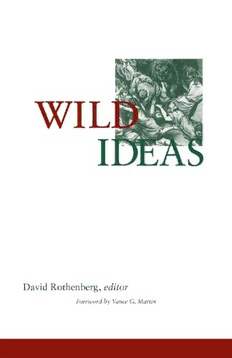
Wild Ideas PDF
Preview Wild Ideas
WILD IDEAS This page intentionally left blank WILD IDEAS David Rothenberg editor University of Minnesota Press Minneapolis London Copyright 1995 by the Regents of the University of Minnesota Chapter i was first published in slightly different form as "Wildness, Wise Use, and Sustainable Development," Environmental Ethics 16, no. 3 (1994): 227-49, copyright R. Edward Grumbine; chapter 10 is reprinted by permission of Arcana Editions, Ontario, Canada; chapter 11 is reprinted with modifications from Tom Wolf's Colorado's Sangre de Cristo Mountains (1995) by permission of the University Press of Colorado. All rights reserved. No part of this publication may be reproduced, stored in a retrieval system, or transmitted, in any form or by any means, electronic, mechanical, photocopying, recording, or otherwise, without the prior written permission of the publisher. Every effort has been made to obtain permission to reproduce copyright material in this book. The publishers ask copyright holders to contact them if permission has inadvertently not been sought or if proper acknowledgment has not been made. Published by the University of Minnesota Press 111 Third Avenue South, Suite 290 Minneapolis, MN 55401-2520 Printed in the United States of America on acid-free paper Library of Congress Cataloging-in-Publication Data Wild ideas / edited by David Rothenberg. p. cm. Includes the results of the 5th World Wilderness Congress held in Tromso, Norway in September 1993. Includes index. ISBN 0-8166-2614-6 (he). — ISBN 0-8166-2615-4 (pb) i. Nature conservation—Philosophy—Congresses. 2. Ecology—Philosophy— Congresses. 3. Wilderness areas—Congresses. 4. Wildlife conservation—Philosophy— Congresses. I. Rothenberg, David, 1962- . II. World Wilderness Congress (5th : 1993 : Tromso, Norway) QH/5.A1W528 1995 333-7'2'oi—dc20 94-49620 The University of Minnesota is an equal-opportunity educator and employer. Contents Illustrations VII Vance Martin Foreword IX David Rothenberg Introduction Wildness Untamed: The Evolution of an Ideal XIII I WHOSE WILD IDEA? R. Edward Grumbine 1 . Wise and Sustainable Uses: Revisioning Wilderness 3 Denis Cosgrove 2 . Habitable Earth: Wilderness, Empire, and Race in America 27 Max Oelschlaeger 3 . Earth-Talk: Conservation and the Ecology of Language 42 II CROSS-CULTURAL WILD Marvin Henberg 4 . Pancultural Wilderness 59 Lois Ann Lorentzen 5 . Reminiscing about a Sleepy Lake: Borderland Views of Women, Place, and the Wild 71 Douglas J. Buege 6 . Confessions of an Eco-Colonialist: Responsible Knowing among the Inuit 81 III THE ART OF THE WILD David Abram 7 . Out of the Map, into the Territory: The Earthly Topology of Time 97 v VI . Contents Irene Klaver 8 . Silent Wolves: The Howl of the Implicit 117 David Rothenberg 9 . The Idea of the North: An Iceberg History 133 R. Murray Schafer 10 . The Princess of the Stars: Music for a Wilderness Lake 150 IV THE WILD REVISED Tom Wolf 11 . Beauty and the Beasts: Predators in the Sangre de Cristo Mountains 163 Robert Greenway 12 . Healing by the Wilderness Experience 182 Andrew Light 13 . Urban Wilderness 195 David Rothenberg Epilogue: Paradox Wild 213 Contributors 219 Index 221 Illustrations page xn Grand Canon. Reproduced from Stanley Wood, Over the Range to the Golden Gate. Chicago: R. R. Donnelley & Sons, 1901. 26 The Ptolemaic Ecumene (the habitable earth, windheads, and sons of Noah, with monstrous races out of frame to the left). Reproduced from Hartmann Schedel, Nuremberg Chronicle, 1493. 116 Black-and-white woodcut by Hans Gerhard S0renson. 132 Reproduced from Julius Payer, Die dsterreichisch-ungarische Nord- pol-Expedition in den Jahren 1872-1874. Vienna: Alfred Holder, 1876. 162 Sangre de Cristo Range. Reproduced from Stanley Wood, Over the Range to the Golden Gate. Chicago: R. R. Donnelley & Sons, 1901. 194 Adam David Clayman, In the Urban Wilderness. By permission. 212 Reproduced from Stanley Wood, Over the Range to the Golden Gate. Chicago: R. R. Donnelley & Sons, 1901. VII This page intentionally left blank Foreword In the arena of international nature conservation, no concept is fraught with more differences in personality, policy, and particularity than is wilderness. Yet, is there anything more important? Wilderness is our original home, our genetic mother, our biological lifeline, our earthly father, and our future se- curity. It is both the bosom that nourishes us and the stick that ultimately corrects our misbehavior. Therefore, the World Wilderness Congress (WWC) was founded in 1977 upon the understanding that a healthy and sane human society is impossible without wilderness, and that the answer to saving wilderness—for our secu- rity or for its own sake—lies in nations, people, and professions cooperating together. The WWC's rationale is, simply, that wilderness conservation must integrate cultural, professional, and political differences. To integrate such differences, one must first listen to his or her colleagues, friends, and adver- saries, understanding where they are coming from, what they are made of, and in what direction they are heading. From this integration emerges effec- tive action. Hence the critical importance of wilderness philosophy to international nature conservation. It helps clarify our origins, establish our identity, dis- cern our various relations to nature, and set our direction. Without this philosophical core, international conservation policy will be ineffective, and shift with the vagaries of politics while held captive by the trepidation of economics. As a result, the WWC has always placed philosophy on an equal footing with science, management, economics, and education, and has helped es- tablish credibility for a holistic approach to environmental problem solving. Through five meetings over sixteen years—in South Africa (1977), Australia (1980), Scotland (1983), the United States (1987), and Norway (1993)—the WWC has become a unique forum and platform for international action in nature conservation, allowing the public to meet and work with profession- als from all sectors, from game rangers to politicians, scientists to poets, managers to philosophers. At the fifth WWC in Troms0, Norway, in September 1993, David Rothen- berg convened an unusual and talented group of thinkers in a symposium to investigate the idea of the wild. In the resulting collection, Wild Ideas, he IX
